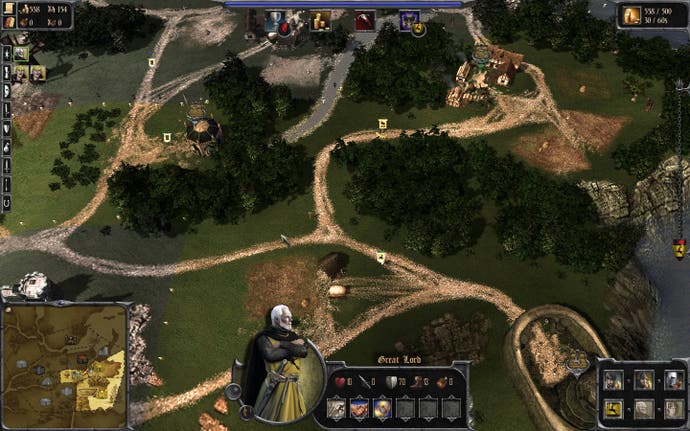A Game Of Thrones: Genesis
A storm of snores.
That's just one element of the cyclic Game Of Envoys. Maybe an Assassin will nobble your Envoy before he completes his mission, or maybe he'll find an enemy Envoy waiting at his destination and thus get sent packing on the spot. Or maybe he'll find that the enemy has married off one of its noblewoman to a crucial neutral town, forming a blood bond that a mere Envoy cannot break. For every unit, a counter-unit.
It grows and stacks and grows, this game of thrones: clever stuff, but it can fast become relentless, a constant moving of fixed-purpose pieces around an ugly, low-tech board to try and interrupt enemy actions you know full well will be happening but can't see or curtail unless you have the right unit in the right place. It could be endless, in theory - which is why in multiplayer and singleplayer skirmish (aka House vs House) you're playing for Prestige Points. First to 100 wins, and the dance of envoys draws to a blessed close.
One thing an Envoy won't suffer is getting beaten up by soldiers. For all the marketing (and indeed the game box's) talk of recreating the most notorious battles from seven centuries of Westerosian history, there's really very little fighting in here. The small number of military units can be used to take out Assassins (if spotted) and arrest turncoats, but really they don't come into play until (and if) a match or level switches from peacetime to wartime. Again, in keeping with the books, most of the time everyone's pretending to be friends but conniving behind the scenes for power and influence.
Once a certain threshold of antagonistic actions is crossed, however, war is declared, diplomacy is largely ruled out and any secret agreements are revealed. Oh, and you'll build and send a thin roster of soldiers, in a fixed and immediately dull rock, paper, scissors arrangement, to defend your holdings and attack the enemy's. Combat between these featureless identi-men is boring to watch and boring to control, bar a few brief setpieces in the campaign that are the only times Genesis toys with ASOIAF's openly fantastical elements.
Fortunately, fighting can often be avoided entirely, as it's eminently possible for one side to rack up enough Prestige Points before war breaks out. What an anti-climax that is, though. Still, at least that's reflective of how Martin tends to end the books, the big tease.

Oh, and a note on the campaign specifically. While you might have thought it the meat of the game, really it's a short-lived collection of extended tutorials that often dispense with the deepest strategies of the game in favour of some miserable, cheerless exposition and lore-spouting. If you must play Genesis, play through the tedious but brief tutorial proper then head straight to House vs House, where you're free from the level-by-level drip-feed of new unit types and able to get right into the full-on politicking.
The same is true of multiplayer, where the level of focus and persistence involved in the subterfuge element means Genesis might pick up a steady audience even though most of the raft of people who bought it because it said Game Of Thrones on the box will have long-since given up on it.
So: come not for the enticing Game of Thrones name, certainly not for the ugly graphics, clunky interface (as appears to be Cyanide's habit of late) and soulless writing, but instead, perhaps, for what genuinely is an ambitious new take on real-time strategising. With verve and wit and gloss, Genesis could have been the start of something fascinatingly, enthrallingly cruel: as it is, it's a song of needless branding and sad compromise.
